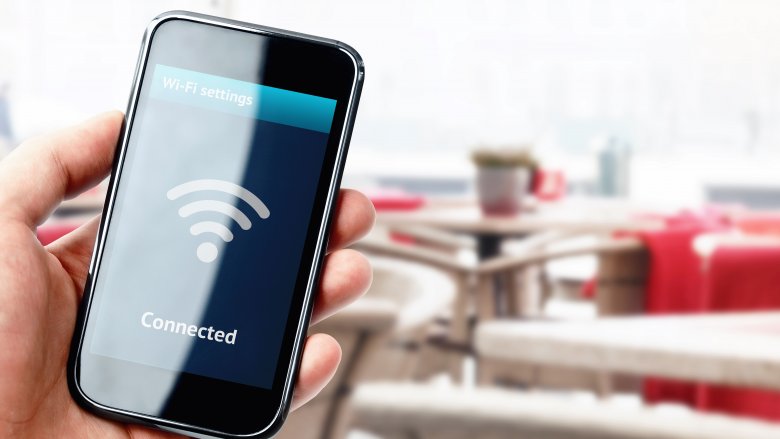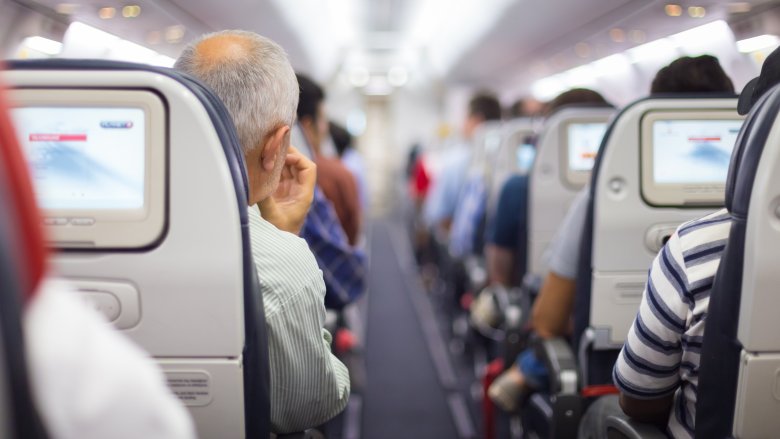Ways We All Break The Law Without Ever Knowing It
For the average law-abiding citizen, the idea of breaking the law is seen as something extreme. As in, the chances of getting into any "official" trouble is unlikely as long as normal and respectable behavior is exhibited. But all across the United States, there are numerous eccentric laws that people break every day. They have no idea what they're doing is illegal because these laws rarely reference dangerous activity. Usually they concern the environment, technology, or a certain etiquette that seems old fashioned (not to mention unnecessary). Start mentally preparing to face the truth, because you're living on the edge of right and wrong.
Having fun at a beach
When visiting the beach, it's normal to participate in sporting activities. You might bust out a Frisbee or football to throw around with friends, and you probably don't feel like a risk-taker when you do. In fact, it seems expected. However, the Frisbee in particular has been the subject of conversation among lawmakers since the 1970s. There used to be a cold turkey ban on them, which got lifted to a ruling that Frisbee may be thrown in designated areas or with permission of a lifeguard. This is obviously very relaxed because Frisbees are thrown all over the place at beaches in Los Angeles County without anyone batting an eyelid. Basically, unless a lifeguard instructs the Frisbee game to stop, it's not a problem. Supposedly, the ban on Frisbee and footballs is still in effect for the period between Memorial Day and Labor Day, though. You know, the summertime. When people like to get out and about.
There are many other strange ordinances, such as producing any "boisterous or unusual noise," "operating a model airplane," and "disturbing any rock on the beach." As a first-time violator of these infractions, the fine is $100 if you're caught. Yikes.
In Florida, it is illegal to sing in a public place while wearing a bathing suit. OK, that wins fair and square. Before you hit the beach, swing by City Hall and pick up a copy of the local laws just to be safe.
Having fun at national parks
National parks are relaxing places to spend time in, and due to their immense size, people are usually not concerned about noise levels or rigorous activity. Because it's a park; there's space for everyone to run around and enjoy the scenery or wildlife. Right? Not so much. There are a bunch of persnickety rules about park etiquette, including not teasing breeding animals and not rolling anything down a hill. No toboggan. No Zorb ball. Nothing that could cause someone to take a hit. Plus those things might disturb the plant life, so ... oh, OK, fair enough.
At Kaloko-Honokohau National Park, it's illegal to go skinny-dipping unless you're under 10 years old. Now, ready for a surprise? There's a law that prohibits taking a cat on a whitewater boat trip through the Grand Canyon, which means someone must have tried it once. And even if all you want to do is pick a flower for your significant other, that's not allowed. Basically, these rules dictate that park visitors be mature at all times. If your idea of fun is a little lower-brow, (don't) take a hike.
Making a bet with your friends
It's the World Cup, and you're participating in a friendly bet among friends. Sure, that seems like fun. But technically it has consequences, and they are eccentric. For example, you can make a bet in most U.S. states. But you cannot take a bet in most states. To clarify, that means you cannot accept someone else's bet. Of course, the anti-gambling laws differ from state to state and they're fuzzy at best. Prosecution is extremely unlikely, unless the person running the pool is taking a cut of the winnings and the whole thing goes public. Even then, federal lawmakers have bigger fish to fry. As for online gambling, it's illegal in some states (Washington) and legal in others (New Jersey). Hey, if you're in doubt, you can always go and bet in a Las Vegas casino. Nothing's off-limits there.
Using a fake name online
Since basic identification is assigned at birth, there's really no need to pretend to be anybody else. Some people like to use other names they feel more comfortable with. That's perfectly fine — as long as you're not deceiving anyone, that is, pretending to be someone you're not. Using a fake name on the internet is particularly serious because it poses a cyber threat and violates the Computer Fraud and Abuse Act.
NPR notes that it's not the same as giving a fake name in person during a physical exchange because in that situation there's usually no agreement prohibiting the use of false information (just a looser social expectation that people won't lie to your face). With social networks, there is a strict written agreement — and it's there to protect every user and their activity. For example, Facebook's Terms of Service prohibit false information being provided in personal accounts. Instagram's Terms of Service employ similar rules, stating that users must not "impersonate or intimidate people or entities." And let's face it, usually when a person is assuming an alternative identity online, they're after something or someone they shouldn't be pursuing. That's where it gets nasty.
Sharing medications with friends or family
Have you ever been traveling on an international flight and had a friend slip you a Xanax to ease the pain. Harmless? Yeah, probably, but it's also in violation of the law. That medication was prescribed in a specific dosage to one person based on their personal circumstances, and people react differently to drugs, so they're not meant to be shared willy-nilly.
As the U.S. Food and Drug Administration explains, a lot of the risk has to do with side effects. All drugs have them, and if the medicine wasn't prescribed to you, it could contain an ingredient that you're not supposed to take. Then there's the issue of becoming dependent on the drug, and the lack of medical oversight that occurs when people consume drugs that aren't meant for them. It all makes sense.
Connecting to unsecured Wi-Fi networks
With the internet being such a huge part of daily life, it's not that unusual to connect to a random Wi-Fi network. The internet might be down in your place, so you find one in your neighborhood that doesn't require a password. Easy enough? Yes. Harmless? Hmm, probably ... but since you've technically accessed a network without authorization, it's a violation of the Computer Fraud and Abuse Act. And suddenly, that sounds very official and scary. It's similar to illegally downloading media – frowned upon, but you probably won't be prosecuted. You'd have to be using the Wi-Fi network in a way that attracts attention over time, like repeatedly exploiting a business that provides it in exchange for the purchase of goods and services. Rule of thumb: if it's unsecured, you probably don't want to be using it anyway. The internet can be a precarious place.
Carrying a permanent marker or aerosol can
No one would assume that a permanent marker could cause unrest. Yet in 2009, two guys in Iowa covered their faces with permanent black marker and were arrested for breaking and entering. Their unusual marker usage might not have made national headlines, but in 2010 a 13-year-old boy in Oklahoma was busted for illegal marker possession. If that doesn't sound silly enough, he was escorted by police to a juvenile holding center. Even though he was simply writing with the marker on a piece of paper (at school!), he violated an obscure city ordinance that prohibits the carrying of permanent markers or aerosol cans on private property. The latter part makes sense because aerosol cans are routinely used for graffiti, but getting into trouble for correctly using a Sharpie? That seems like overkill.
Opening someone else's mail
This is amusing because on the surface it seems so utterly harmless. Yet it is a federal offense to open correspondence that is meant for someone else. Like every item on this list, the devil's in the details. Obviously, if you're just at home and you open your neighbor's mail on accident, it's not like the feds are going to come and bang your door down. All you have to do is find out who it belongs to and hand it over with a smile — like it never happened.
But if you willingly open someone else's mail and then throw it away instead of figuring out who the intended recipient is or sending it back to the original address, it's technically a violation. The risk is that the piece of mail could contain important information like social security numbers or other personal details, and now it's exposed for someone unsavory to potentially find and use for their own benefit. Criminals are out there and they can be very strategic, so let's not help their cause by distributing open mail into unsafe places. To be safe, open only what's yours. The rest is not your business.
Not getting a license for your dog
Just like humans need a license to drive, it's a state and local law that pet dogs in the City of Los Angeles (and in most other cities) require licenses as a form of identification. Wait, isn't that the point of a microchip? According to the American Humane Society, the only real difference between a license and a microchip is that microchips are permanent. So in order to have the best chance of finding your dog if it gets lost, both forms of ID are advised. The license also indicates what vaccinations the dog has had, which could be helpful in some circumstances. Owners are supposed to obtain this license around the time they get their dog spayed or neutered, but if you haven't done that, you're not the only one. Despite their legitimacy, there is little discussion about dog licenses online.
Still, if you get caught without a dog license somewhere like New York City, there's a $120 fine. That's steep for a service that you could easily miss in animal shelters or veterinary clinics. You know, the typical places that pet parents learn how to take care of their animals.
Not adhering to airplane etiquette
Like any public space, there's a particular behavior that's expected in an airplane. Passengers are supposed to be safe and courteous, not congregate, not smoke, and generally act in a quiet and subdued manner for the duration of the flight. Some rules cross over into the bizarre, however.
TSA guidelines once instructed that gel shoe inserts were not allowed, but thankfully the TSA's official Twitter account walked that policy back in 2015 so we can again gel like felons. The American Airlines website has a section concerning "extraordinary delays" which states, "In the case of extraordinary events that result in very lengthy onboard delays, American will make every reasonable effort to ensure that essential needs of food (snack bar such as Nutri-Grain), water, restroom facilities, and basic medical assistance are met." Do things have to be really that dire in order to get a granola bar? Even when flights are delayed or canceled, flight crews aren't known for showering passengers with edible gifts.










